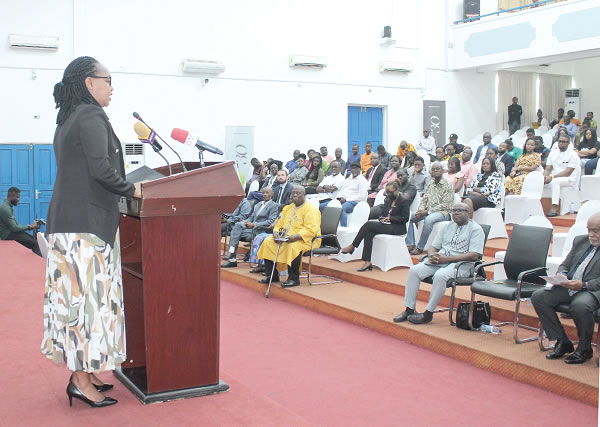
The High Commission of Rwanda in Ghana has organised a symposium to commemorate the 1994 genocide against the Tutsi in Rwanda.
The symposium was to raise awareness about the genocide and provide recommendations to policymakers on how to fight against all forms of manifestations of genocide.
The symposium, themed “Kwibuka 30, remember, unite and renew” is one of three activities lined up to mark 30 years of the event.
The symposium, co-hosted by the High Commission in Ghana and the Ghana Institute of Management and Public Administration (GIMPA), brought together scholars, civil society organisations, members of the Rwandan Community in Ghana, students, the diplomatic community and survivors of the genocide.
Collective action
The Rwanda High Commissioner to Ghana, Rosemary Mbabazi, stressed the need for collective action to prevent similar atrocities from happening again.
She urged academia to include lessons on the Rwandan genocide in their curricula, the media to report responsibly and avoid spreading hate speech, and civil society to promote unity and human dignity.
She emphasised that the fight against genocide ideology and hate speech required sustained effort and collective action.
The High Commissioner also recognised the Ghanaian contingent that stood with Rwanda during the genocide, led by a Ghanaian Senior Army Officer and Deputy Force Commander and chief of staff for the United Nations Assistance Missions for Rwanda in 1994, Major General Henry Kwami Anyidoho (rtd), and expressed gratitude to Ghanaians for their support.
She called for the establishment of monuments across Ghana to remind future generations of the importance of peace and unity.
Confronting the truth
The Rector of the Ghana Institute of Management and Public Administration (GIMPA), Professor Samuel Bonsu, stressed the need for empathy, reflection and action to uphold human dignity and prevent such tragedies from happening again.
He praised the resilience and courage of the Rwandan people who had made remarkable progress in recovering from the tragedy.
However, Prof Bonsu emphasised that remembrance alone was not enough, and that “we must confront the uncomfortable truths that led to the tragedy, including deep-seated prejudice, systemic inequalities, and the failure of the international community to intervene,” he stated, and urged all to stand in solidarity with the survivors, support efforts to rebuild their lives and communities, and reaffirm our commitment to never again allow such atrocities to happen.
Importance of remembering
The United Nations Resident Coordinator, Charles Abani, called on Ghanaians in particular to learn from the lessons of the Rwandan genocide and to take action to prevent similar events from occurring, and urged Africans and the global community to come together to prevent similar atrocities from happening again.
He warned that the horrors of the genocide served as a stark reminder of the consequences of hatred, division and indifference.
Genocide, he said, was a crime against humanity that transcended the borders, cultures and time, and that prevention was key.
The UN Resident Coordinator highlighted the importance of education, countering hate speech, the need for justice, accountability, unity and solidarity in preventing similar atrocities.
He called on individuals, communities and nations to come together to build a world where everybody was valued and respected.
Experiences
A panel composed of Major General Anyidoho, who is also the author of the book, “Guns over Kigali” , which recounts his personal account of genocide against the Tutsi in Rwanda in 1994; Deputy Inspector General of Rwanda National Police and Honorary Consul of Ghana in Rwanda, Denis Karare; a lecturer of the University of Rwanda, Prof Denis Bekisha; Co Director of Ellel Rwanda, Lambert Bariho, and a survivor of the genocide against the Tutsi, Dr Odette Nyiramilimo, shared their experiences and offer recommendations on how to fight against manifestations of genocide.
They stressed the importance of promoting tolerance, understanding and peaceful coexistence among all people.











